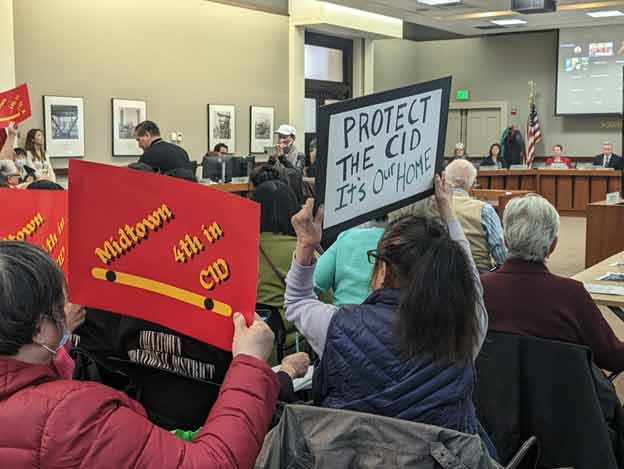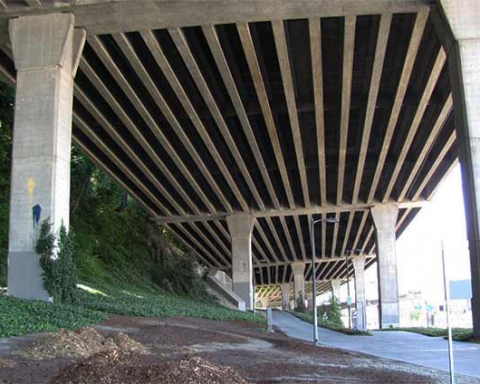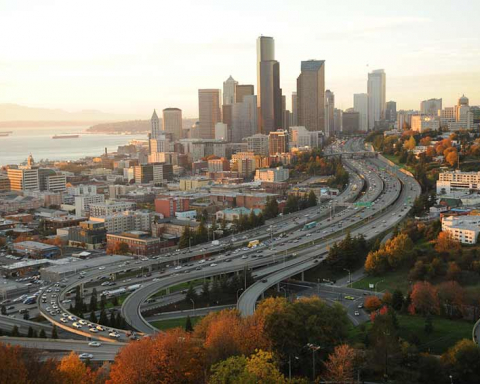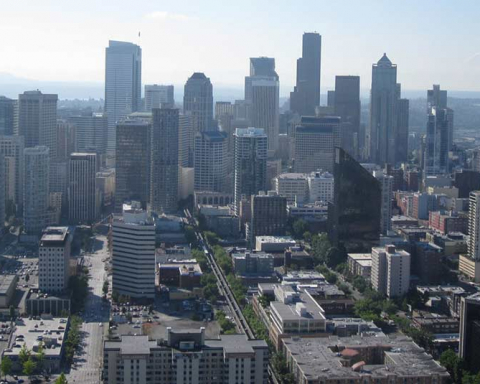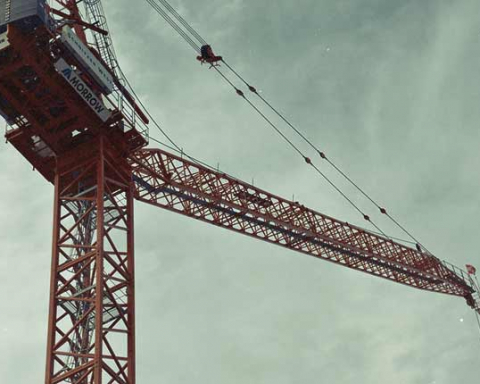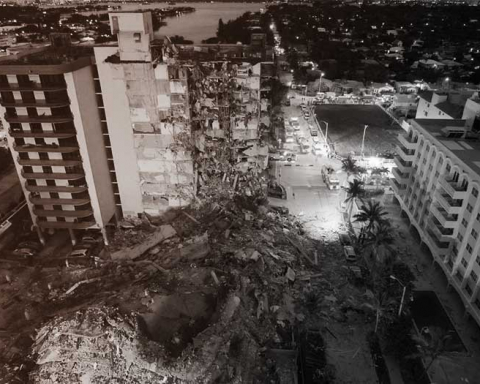Photo: The March 23rd Sound Transit meeting turned into dueling rallies between Pro 4th Ave station (left) and CID Alliance (right) over the location of the future CID station.
By Connor Nash
Like many government board meetings, the Sound Transit meetings are scheduled at a time that the vast majority of the community would be unable to make it, the 3rd Thursday of each month at 1:30 pm. For the March meeting, the Union Station room was fully packed far before the start time, with only standing room available by 1 pm.
There were distinct groups, and each had its own swag and posters for supporters to carry or wear. Red “Midtown/4th Ave” posters were everywhere, with over 50 people waving signs at the beginning of the meeting. Over a dozen people had homemade Pro North/South posters with an anti-displacement message. Finally, a dozen supporters of the Mayor’s Terry Ave station proposal wore Red “Don’t Kill SLU” stickers.
Each faction was determined to have the board listen and vote for their station plan. The mood in the room was cordial but tense since the board’s decision would have a massive impact on the city for the “next 100 years,” as one public commentator put it.
Before the public comment period started, King County Executive Dow Constantine told the audience that the public comment period was extended to 90 minutes; in an attempt to accommodate all the constituents who signed up.
Nearly half the people who signed up were unable to speak.
In the first section of the meeting, supporters of the North/South CID stations dominated the public comment. The concerns of the North/South supporters included a decade of construction, gentrification concerns, and potential destruction of the CID community.
Mike Vu, the owner of Itsumono, said in his public comment, “The last three years have been difficult for business owners in our district… to ask for another 9-11 years…will close more businesses down.”
Once Vu finished, members of the CID Alliance waved their “Pro North/South” sign, provided by Binko Chiong-Bisbee, owner of Kobo at Higo. Chiong-Bisbee echoed many of the concerns of the proposed 4th Ave station, stating “Once the CID is hollowed out with ten years of construction and traffic diversion it will be a shadow of what it is today.”
Younger members of the CID Alliance also spoke on the potential destruction of a culturally significant neighborhood.
After many CID Alliance members spoke on their equity message, a large group of the elderly Pro-4th Ave attendees left in an orderly commotion. This walkout may have been caused by the significant number of Pro North/South people speaking at the beginning.
After the walkout, most of the speakers were either Pro 4th Ave or Pro Terry Ave station.
The Pro 4th Ave speakers were also in lock step with their public comment, focusing on how the elderly would easily use the 4th Ave station, greater economic revitalization for CID from transit riders, and a more convenient route for riders compared to the North/South option.
Betty Lau, a long-time resident of CID, told the board “Don’t leave out the seniors who are in the audience here now or in the future…We cannot have one Seattle if CID and Midtown are skipped. You’ll have two Seattles; the haves and the have-nots.”
During his public comment, Brien Chow, co-founder of Transit Equity for All, told Sound Transit what many in the community think of their preferred station option.
- 5,153 Move Forward on 4th petition signatures
- 2,116 Action network Letters in supporting 4th Ave
- 1,358 from CID community members
- 44+ businesses and the Chinatown BIA supporting the 4th Ave station
“This board should follow the will of the majority because your own study show [4th ave] is the only station that provides the connection and access for everybody in the region,” said Chow.
Amy Chen-Lozano of Transit Equity for All (pro 4th Ave) had the most direct comment to supporters of the North/South option. “I have never seen our CID thrive. Our neighborhood deserves to thrive. We deserve reinvestment. We deserve revitalization. Please do not allow fearmongers to prevent progress.”
I asked afterward who are the fearmongers, and Chen-Lozano said she was referring to the CID Alliance. She said that their fears are “not unfounded” and “rooted in history,” but “at some point, you need to come up with an actual solution.”
Many organizations in CID, and greater Seattle, spoke in support of the 4th Ave option including; the owner of Uwajimaya, Chinatown International District BIA, SCIDpda, Pioneer Square BIA, and First Hill BIA, Seattle Subway.
By the end of the 90 minutes, 59 people spoke; 30 supported 4th Ave station, 19 supported North/South, and 18 supported Terry Ave (2 had other opinions or were difficult to understand). 46 people did not speak in the allotted time, which led to one person to yell “Schedule your meetings better!” A statement I doubt no one in the audience disagreed with.
After a lengthy Executive Session, the board was back to discuss and vote on the proposals. Mayor Harrel spoke on his amendment to advance both the North/South proposal and the 4th Ave proposal, along with his plan for a Terry Ave station. Although North/South and 4th Ave were in this amendment, Harrel was extremely supportive of the North/South option stating,
“Because of a lot of the testimony you heard, but in terms of my own political and personal experience in my commitment to CID to make sure we do not harm…We asked this community…to take the brunt of the construction impact. I believe the North/South option is a viable alternative worth of exploration.”
Both pro-4th Ave speakers and pro-North/South speakers talked about equity and fairness in the community during their comments. Harrel seemed to only listen to the minority opinion of North/South supporters instead of the plurality of 4th Ave speakers in attendance.
In what feels like a consultation prize for the 4th Ave station support, Sound Transit voted on a plan to work with Seattle and King County about the future of Union and King St Station (since the 4th ave option would revitalize them). Sound Transit staff are direct “to clarify the potential scope and schedule of such improvements as well as funding and partnership opportunities; and to conduct further community engagement.”
What further improvements could help two underutilized train stations outside of a new Sound Transit station is still to be determined and I believe the community has been engaged a lot in the past few years about what they want from Sound Transit. But the community will be engaged with more by sound Transit.
By the end of the meeting, the board simultaneously made big decisions and kicked the can down the road for a final decision. Everything seemed to stay the same by the end of the meeting, keeping the “Confusion in the Community.”
By Connor Nash

